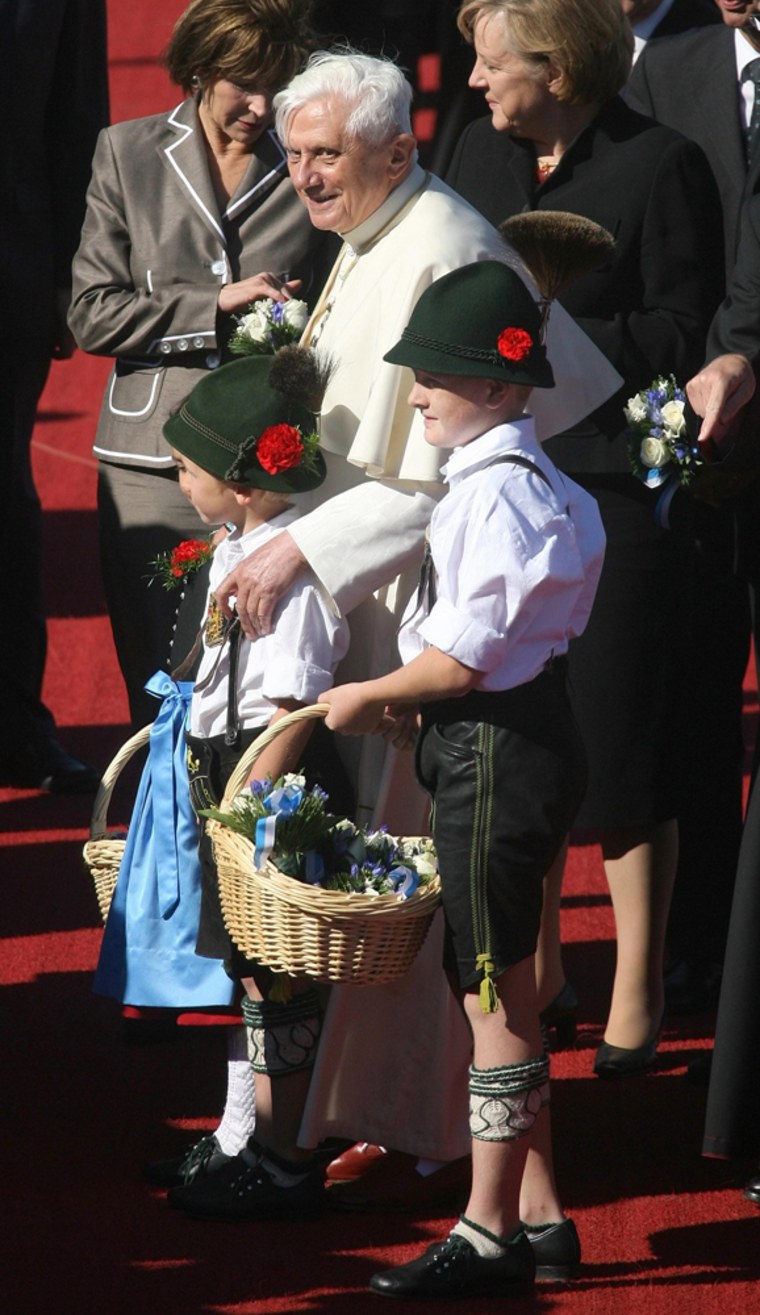Church bells pealed across Munich as Pope Benedict XVI on Saturday began a six-day homecoming to his native Bavaria, the city where he served as priest and archbishop more than a quarter-century ago.
The visit is the former Cardinal Joseph Ratzinger’s second to Germany, but his first to his Bavarian homeland, since his April 2005 election to succeed Pope John Paul II.
The crowd waved yellow and white Vatican flags as the 79-year-old pope descended the gangway after landing at the Munich Airport. He removed his skullcap — avoiding the mishap that occurred last year in Cologne, when the wind pulled it off.
German President Horst Koehler and Chancellor Angela Merkel greeted the pontiff ahead of his ride to the city’s central Marienplatz square, where he was to offer a prayer at its 17th-century statue of the Virgin Mary, the patroness of Bavaria — Germany’s Roman Catholic heartland.
On the plane, Benedict told reporters he would like to visit more of Germany in the future.
“I am an old man,” he said. “I don’t know how much time the Lord will grant me.”
“At least one more time, I am getting to see my homeland,” he said. “My heart beats Bavarian.”
Greeted by cheers, church bells
In the city center, bells rang from the landmark Church of Our Lady, joined in a thunderous chorus of other church bells as people lining the streets cheered his arrival, watching on outdoor video screens, and waved the Vatican flag.
Gregor Pircher, 41, drove 160 miles from his home in south Tirol, Italy, to get a glimpse of Benedict, even though he disagrees with him on some issues.
“I don’t agree with everything he stands for, as with abortion and homosexual marriage. The church should not get involved with abortion, and I believe gay marriage is fine. But society must have certain moral standards,” Pircher said.
Anna Haffenmeyer, a nun who works as a missionary in Bolivia and came to her native Bavaria on vacation, came to the square “to experience him up close. I know his message with bring us back to Christ.”
On Sunday, Benedict was to lead an open-air mass for an expected 250,000 people at the sprawling trade fair grounds on the city’s outskirts.
Benedict’s election aroused mixed feelings in Germany — the now largely secular land of the Protestant Reformation, and home to a shrinking and distinctly liberal Catholic Church. But there is also strong pride in the German pope, particularly in Bavaria.
Munich’s Abendzeitung newspaper devoted its front page to a photo of a smiling Benedict under the headline “Welcome home!” The Munich edition of the mass-circulation Bild daily’s front page said: “Benedict, we love YOU.”
Family ties
During his trip, the pope planned to stop briefly in Marktl am Inn — the small town where he was born in 1927 and spent the first two years of his life — to visit the graves of his sister and parents in Regensburg, and to spend a day with his elder brother, the Rev. Georg Ratzinger.
However, the visit is not all about revisiting Benedict’s personal roots. One of the chief goals of Benedict’s papacy is to battle trends toward an increasingly secular society, particularly in western Europe.
“The purpose of the visit is precisely because I want to see again the places where I grew up, the people who touched and shaped my life. I want to thank these people,” he said in an interview last month with German television networks.
“Naturally I also want to express a message that goes beyond my country, just as my ministry calls me to do,” he said. “The basic theme is that we have to rediscover God, not just any God, but the God that has a human face, because when we see Jesus Christ we see God.”
“It’s become more difficult to believe because the world in which we find ourselves is completely made up of ourselves; and God, so to speak, doesn’t appear directly anymore,” Benedict said.
Benedict was ordained a priest in Freising, outside Munich, and taught theology at the University of Regensburg and elsewhere before becoming the archbishop of Munich in 1977. He left Bavaria after being named to a post at the Vatican by John Paul II in 1981.
